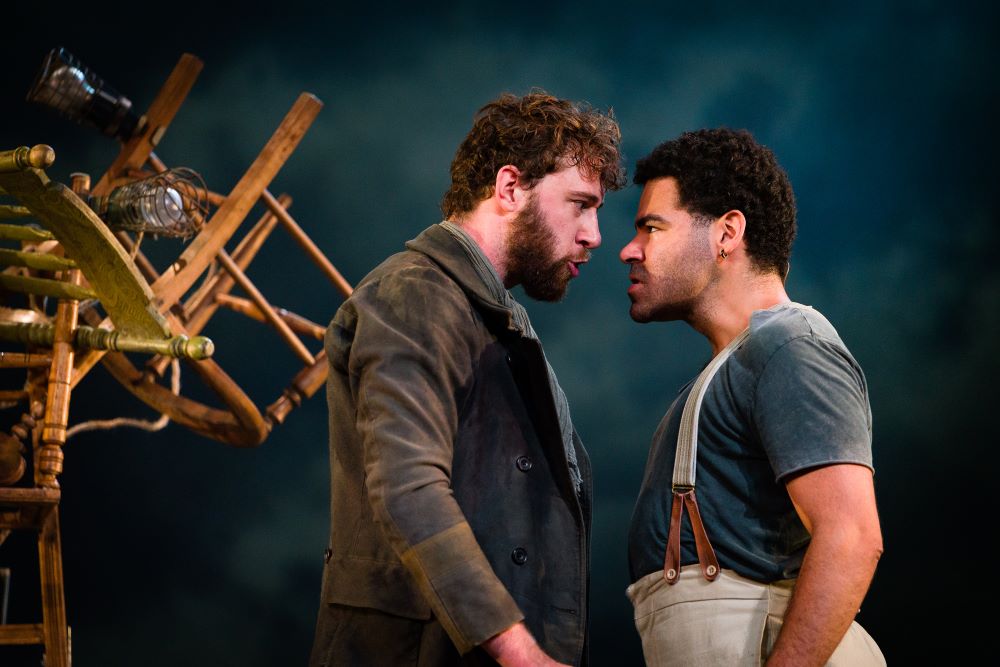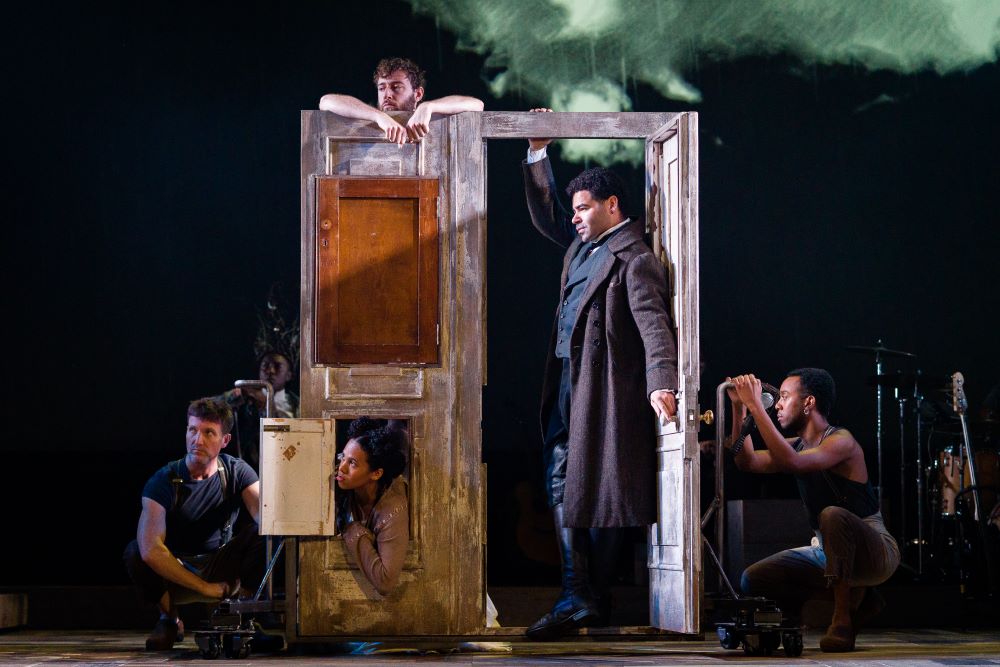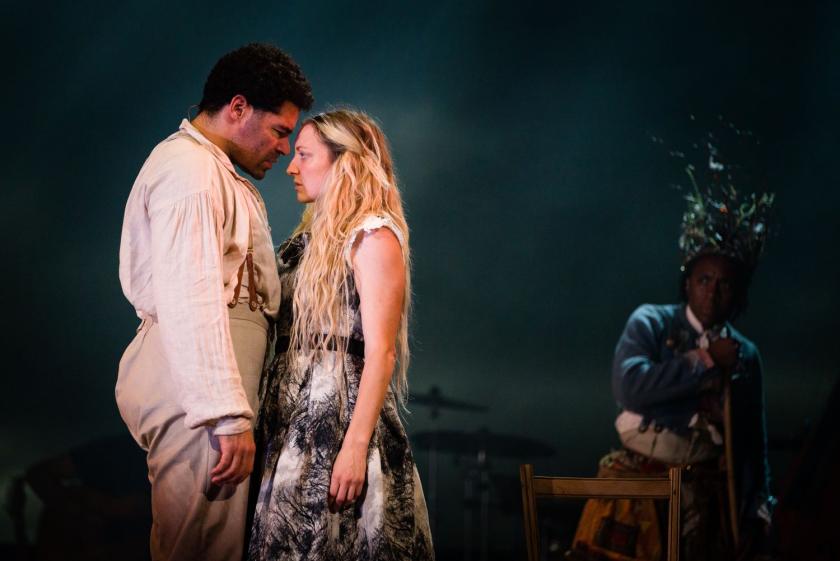“If you want romance,” the cast of Emma Rice’s new version of Wuthering Heights say in unison just after the interval, “go to Cornwall.” They’re using the modern definition of romance, of course – Emily Brontë’s novel is full of the original meaning of "romantic", much wilder and more dangerous than anything Ross Poldark gets up to.
Rice’s anarchic adaptation preserves that feral quality, with the Moor itself telling the doomed love story of Cathy (Lucy McCormick) and Heathcliff (Ash Hunter), but doesn’t do enough to keep up its energy.
The opening is more Kafkaesque than Brontësque (though perhaps the former was inspired by the latter). Lockwood (Sam Archer), the new tenant of Thrushcross Grange, is at Wuthering Heights, his landlord Heathcliff’s other property, to introduce himself. His attempts at conversation are rebuffed by Heathcliff, a young woman (Witney White) and a young man (Tama Phethean, pictured below, with Hunter), who are later revealed to be Heathcliff’s niece and nephew, Cathy Linton and Hareton Earnshaw. Lockwood desperately tries to be offered a cup of tea, but instead he’s shown to a room where he finds the diary of the late Catherine Earnshaw, Cathy’s mother and Hareton’s aunt. It's never a good sign when you need a family tree to understand a play. But Rice keeps everything ticking along well enough that it doesn’t really matter who’s whose aunt or nephew or cousin/wife. She’s transformed Brontë’s servant narrator, Nelly, into the personified Moor, which functions as a Greek chorus, unspooling the tragedies of the Earnshaws and the Lintons. Nandi Bhebhe is spellbinding as the Leader of the Moor, managing to be both a powerful elemental presence and a nurturing friend to the human characters.
It's never a good sign when you need a family tree to understand a play. But Rice keeps everything ticking along well enough that it doesn’t really matter who’s whose aunt or nephew or cousin/wife. She’s transformed Brontë’s servant narrator, Nelly, into the personified Moor, which functions as a Greek chorus, unspooling the tragedies of the Earnshaws and the Lintons. Nandi Bhebhe is spellbinding as the Leader of the Moor, managing to be both a powerful elemental presence and a nurturing friend to the human characters.
Brontë described Heathcliff’s hair and skin as “dark” and “dusky”, but he’s mostly been portrayed by white actors (notably Lawrence Olivier in the 1939 film). Hunter, for many years the alternate Alexander Hamilton in the West End version of the musical, shows off his powerful voice in Heathcliff’s sung lines. His Heathcliff is remorseless, but still somehow sympathetic, because we’ve seen the racist brutalisation that made the monster. “If I smile, will they just see my teeth?” he wonders.
Etta Murfitt’s muscular choreography is reminiscent of Frantic Assembly’s best work – actors writhe and twist like wind-blown grass, and fly through the air suspended on each other's shoulders. Little Linton’s (Katy Owen) attempts to escape from Hareton’s steely grasp are a highlight. It’s a shame the Moor’s lines in unison just aren’t intelligible enough to hit with full power.
Wuthering Heights is brilliant when it’s good – but it’s not good often enough. It’s not Rice’s fault that the source material is as bleak and seemingly endless as the real-life Moors (the show runs to just under three hours). People are always dying, getting married, getting married and then dying, bullying each other, being born, or dying in childbirth. It’s like Love Island, but nobody even pretends to be happy.  That is, until we get to the third generation of these weird intertwined dynasties. At the end of the play, Lockwood returns to find that Cathy and Hareton have salvaged a loving relationship from the wreckage of the cruelty that Heathcliff doled out to them (ignore the fact that they’re first cousins, it’s the 1840s). It makes for a jarring conclusion, but again, that’s Brontë’s problem.
That is, until we get to the third generation of these weird intertwined dynasties. At the end of the play, Lockwood returns to find that Cathy and Hareton have salvaged a loving relationship from the wreckage of the cruelty that Heathcliff doled out to them (ignore the fact that they’re first cousins, it’s the 1840s). It makes for a jarring conclusion, but again, that’s Brontë’s problem.
This is an intensely theatrical show, in the sense that it draws attention to the fact that it’s a play. The actor playing Lockwood has to be reminded that he needs to step back into his initial role for the story to end. The stage managers are part of the show – the wings are open to the elements, so we can see them chucking props to the cast. As people die, their names are written on slates and held up towards the audience like tombstones, and their actors merge back into the Moor.
Wuthering Heights is a joint venture of the NT, Wise Children (Rice’s production company), Bristol Old Vic and York Theatre Royal. It’s a story told by a community, onstage and off. It embarked on tour in autumn 2021; sadly it’s not stopping on the Moors, although there was a run in York in November. Roughly a third of it drags; roughly two thirds is just the ticket for a cold February evening. Take your chances.















Add comment